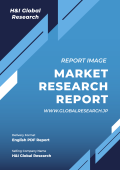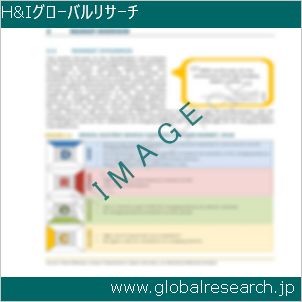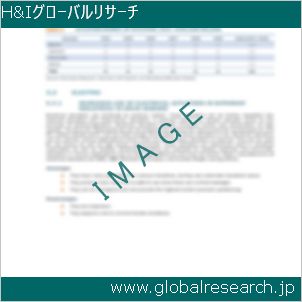1 Study Coverage
1.1 Bio-Isoprene Product Introduction
1.2 Market by Type
1.2.1 Global Bio-Isoprene Market Size by Type, 2017 VS 2021 VS 2028
1.2.2 Microbial Fermentation
1.2.3 Chemical Conversion
1.3 Market by Application
1.3.1 Global Bio-Isoprene Market Size by Application, 2017 VS 2021 VS 2028
1.3.2 Automobile Tires
1.3.3 Medical Appliances
1.3.4 Footwear
1.3.5 Sporting Goods
1.3.6 Others
1.4 Study Objectives
1.5 Years Considered
2 Global Bio-Isoprene Production
2.1 Global Bio-Isoprene Production Capacity (2017-2028)
2.2 Global Bio-Isoprene Production by Region: 2017 VS 2021 VS 2028
2.3 Global Bio-Isoprene Production by Region
2.3.1 Global Bio-Isoprene Historic Production by Region (2017-2022)
2.3.2 Global Bio-Isoprene Forecasted Production by Region (2023-2028)
2.4 North America
2.5 Europe
2.6 China
2.7 Japan
3 Global Bio-Isoprene Sales in Volume & Value Estimates and Forecasts
3.1 Global Bio-Isoprene Sales Estimates and Forecasts 2017-2028
3.2 Global Bio-Isoprene Revenue Estimates and Forecasts 2017-2028
3.3 Global Bio-Isoprene Revenue by Region: 2017 VS 2021 VS 2028
3.4 Global Bio-Isoprene Sales by Region
3.4.1 Global Bio-Isoprene Sales by Region (2017-2022)
3.4.2 Global Sales Bio-Isoprene by Region (2023-2028)
3.5 Global Bio-Isoprene Revenue by Region
3.5.1 Global Bio-Isoprene Revenue by Region (2017-2022)
3.5.2 Global Bio-Isoprene Revenue by Region (2023-2028)
3.6 North America
3.7 Europe
3.8 Asia-Pacific
3.9 Latin America
3.10 Middle East & Africa
4 Competition by Manufactures
4.1 Global Bio-Isoprene Production Capacity by Manufacturers
4.2 Global Bio-Isoprene Sales by Manufacturers
4.2.1 Global Bio-Isoprene Sales by Manufacturers (2017-2022)
4.2.2 Global Bio-Isoprene Sales Market Share by Manufacturers (2017-2022)
4.2.3 Global Top 10 and Top 5 Largest Manufacturers of Bio-Isoprene in 2021
4.3 Global Bio-Isoprene Revenue by Manufacturers
4.3.1 Global Bio-Isoprene Revenue by Manufacturers (2017-2022)
4.3.2 Global Bio-Isoprene Revenue Market Share by Manufacturers (2017-2022)
4.3.3 Global Top 10 and Top 5 Companies by Bio-Isoprene Revenue in 2021
4.4 Global Bio-Isoprene Sales Price by Manufacturers
4.5 Analysis of Competitive Landscape
4.5.1 Manufacturers Market Concentration Ratio (CR5 and HHI)
4.5.2 Global Bio-Isoprene Market Share by Company Type (Tier 1, Tier 2, and Tier 3)
4.5.3 Global Bio-Isoprene Manufacturers Geographical Distribution
4.6 Mergers & Acquisitions, Expansion Plans
5 Market Size by Type
5.1 Global Bio-Isoprene Sales by Type
5.1.1 Global Bio-Isoprene Historical Sales by Type (2017-2022)
5.1.2 Global Bio-Isoprene Forecasted Sales by Type (2023-2028)
5.1.3 Global Bio-Isoprene Sales Market Share by Type (2017-2028)
5.2 Global Bio-Isoprene Revenue by Type
5.2.1 Global Bio-Isoprene Historical Revenue by Type (2017-2022)
5.2.2 Global Bio-Isoprene Forecasted Revenue by Type (2023-2028)
5.2.3 Global Bio-Isoprene Revenue Market Share by Type (2017-2028)
5.3 Global Bio-Isoprene Price by Type
5.3.1 Global Bio-Isoprene Price by Type (2017-2022)
5.3.2 Global Bio-Isoprene Price Forecast by Type (2023-2028)
6 Market Size by Application
6.1 Global Bio-Isoprene Sales by Application
6.1.1 Global Bio-Isoprene Historical Sales by Application (2017-2022)
6.1.2 Global Bio-Isoprene Forecasted Sales by Application (2023-2028)
6.1.3 Global Bio-Isoprene Sales Market Share by Application (2017-2028)
6.2 Global Bio-Isoprene Revenue by Application
6.2.1 Global Bio-Isoprene Historical Revenue by Application (2017-2022)
6.2.2 Global Bio-Isoprene Forecasted Revenue by Application (2023-2028)
6.2.3 Global Bio-Isoprene Revenue Market Share by Application (2017-2028)
6.3 Global Bio-Isoprene Price by Application
6.3.1 Global Bio-Isoprene Price by Application (2017-2022)
6.3.2 Global Bio-Isoprene Price Forecast by Application (2023-2028)
7 North America
7.1 North America Bio-Isoprene Market Size by Type
7.1.1 North America Bio-Isoprene Sales by Type (2017-2028)
7.1.2 North America Bio-Isoprene Revenue by Type (2017-2028)
7.2 North America Bio-Isoprene Market Size by Application
7.2.1 North America Bio-Isoprene Sales by Application (2017-2028)
7.2.2 North America Bio-Isoprene Revenue by Application (2017-2028)
7.3 North America Bio-Isoprene Sales by Country
7.3.1 North America Bio-Isoprene Sales by Country (2017-2028)
7.3.2 North America Bio-Isoprene Revenue by Country (2017-2028)
7.3.3 United States
7.3.4 Canada
8 Europe
8.1 Europe Bio-Isoprene Market Size by Type
8.1.1 Europe Bio-Isoprene Sales by Type (2017-2028)
8.1.2 Europe Bio-Isoprene Revenue by Type (2017-2028)
8.2 Europe Bio-Isoprene Market Size by Application
8.2.1 Europe Bio-Isoprene Sales by Application (2017-2028)
8.2.2 Europe Bio-Isoprene Revenue by Application (2017-2028)
8.3 Europe Bio-Isoprene Sales by Country
8.3.1 Europe Bio-Isoprene Sales by Country (2017-2028)
8.3.2 Europe Bio-Isoprene Revenue by Country (2017-2028)
8.3.3 Germany
8.3.4 France
8.3.5 U.K.
8.3.6 Italy
8.3.7 Russia
9 Asia Pacific
9.1 Asia Pacific Bio-Isoprene Market Size by Type
9.1.1 Asia Pacific Bio-Isoprene Sales by Type (2017-2028)
9.1.2 Asia Pacific Bio-Isoprene Revenue by Type (2017-2028)
9.2 Asia Pacific Bio-Isoprene Market Size by Application
9.2.1 Asia Pacific Bio-Isoprene Sales by Application (2017-2028)
9.2.2 Asia Pacific Bio-Isoprene Revenue by Application (2017-2028)
9.3 Asia Pacific Bio-Isoprene Sales by Region
9.3.1 Asia Pacific Bio-Isoprene Sales by Region (2017-2028)
9.3.2 Asia Pacific Bio-Isoprene Revenue by Region (2017-2028)
9.3.3 China
9.3.4 Japan
9.3.5 South Korea
9.3.6 India
9.3.7 Australia
9.3.8 China Taiwan
9.3.9 Indonesia
9.3.10 Thailand
9.3.11 Malaysia
10 Latin America
10.1 Latin America Bio-Isoprene Market Size by Type
10.1.1 Latin America Bio-Isoprene Sales by Type (2017-2028)
10.1.2 Latin America Bio-Isoprene Revenue by Type (2017-2028)
10.2 Latin America Bio-Isoprene Market Size by Application
10.2.1 Latin America Bio-Isoprene Sales by Application (2017-2028)
10.2.2 Latin America Bio-Isoprene Revenue by Application (2017-2028)
10.3 Latin America Bio-Isoprene Sales by Country
10.3.1 Latin America Bio-Isoprene Sales by Country (2017-2028)
10.3.2 Latin America Bio-Isoprene Revenue by Country (2017-2028)
10.3.3 Mexico
10.3.4 Brazil
10.3.5 Argentina
11 Middle East and Africa
11.1 Middle East and Africa Bio-Isoprene Market Size by Type
11.1.1 Middle East and Africa Bio-Isoprene Sales by Type (2017-2028)
11.1.2 Middle East and Africa Bio-Isoprene Revenue by Type (2017-2028)
11.2 Middle East and Africa Bio-Isoprene Market Size by Application
11.2.1 Middle East and Africa Bio-Isoprene Sales by Application (2017-2028)
11.2.2 Middle East and Africa Bio-Isoprene Revenue by Application (2017-2028)
11.3 Middle East and Africa Bio-Isoprene Sales by Country
11.3.1 Middle East and Africa Bio-Isoprene Sales by Country (2017-2028)
11.3.2 Middle East and Africa Bio-Isoprene Revenue by Country (2017-2028)
11.3.3 Turkey
11.3.4 Saudi Arabia
11.3.5 UAE
12 Corporate Profiles
12.1 Braskem
12.1.1 Braskem Corporation Information
12.1.2 Braskem Overview
12.1.3 Braskem Bio-Isoprene Sales, Price, Revenue and Gross Margin (2017-2022)
12.1.4 Braskem Bio-Isoprene Product Model Numbers, Pictures, Descriptions and Specifications
12.1.5 Braskem Recent Developments
12.2 Genencor (DuPont)
12.2.1 Genencor (DuPont) Corporation Information
12.2.2 Genencor (DuPont) Overview
12.2.3 Genencor (DuPont) Bio-Isoprene Sales, Price, Revenue and Gross Margin (2017-2022)
12.2.4 Genencor (DuPont) Bio-Isoprene Product Model Numbers, Pictures, Descriptions and Specifications
12.2.5 Genencor (DuPont) Recent Developments
12.3 Ajinomoto
12.3.1 Ajinomoto Corporation Information
12.3.2 Ajinomoto Overview
12.3.3 Ajinomoto Bio-Isoprene Sales, Price, Revenue and Gross Margin (2017-2022)
12.3.4 Ajinomoto Bio-Isoprene Product Model Numbers, Pictures, Descriptions and Specifications
12.3.5 Ajinomoto Recent Developments
12.4 Gevo Inc
12.4.1 Gevo Inc Corporation Information
12.4.2 Gevo Inc Overview
12.4.3 Gevo Inc Bio-Isoprene Sales, Price, Revenue and Gross Margin (2017-2022)
12.4.4 Gevo Inc Bio-Isoprene Product Model Numbers, Pictures, Descriptions and Specifications
12.4.5 Gevo Inc Recent Developments
12.5 GlycosBio
12.5.1 GlycosBio Corporation Information
12.5.2 GlycosBio Overview
12.5.3 GlycosBio Bio-Isoprene Sales, Price, Revenue and Gross Margin (2017-2022)
12.5.4 GlycosBio Bio-Isoprene Product Model Numbers, Pictures, Descriptions and Specifications
12.5.5 GlycosBio Recent Developments
12.6 Yokohama Rubber Company
12.6.1 Yokohama Rubber Company Corporation Information
12.6.2 Yokohama Rubber Company Overview
12.6.3 Yokohama Rubber Company Bio-Isoprene Sales, Price, Revenue and Gross Margin (2017-2022)
12.6.4 Yokohama Rubber Company Bio-Isoprene Product Model Numbers, Pictures, Descriptions and Specifications
12.6.5 Yokohama Rubber Company Recent Developments
13 Industry Chain and Sales Channels Analysis
13.1 Bio-Isoprene Industry Chain Analysis
13.2 Bio-Isoprene Key Raw Materials
13.2.1 Key Raw Materials
13.2.2 Raw Materials Key Suppliers
13.3 Bio-Isoprene Production Mode & Process
13.4 Bio-Isoprene Sales and Marketing
13.4.1 Bio-Isoprene Sales Channels
13.4.2 Bio-Isoprene Distributors
13.5 Bio-Isoprene Customers
14 Market Drivers, Opportunities, Challenges and Risks Factors Analysis
14.1 Bio-Isoprene Industry Trends
14.2 Bio-Isoprene Market Drivers
14.3 Bio-Isoprene Market Challenges
14.4 Bio-Isoprene Market Restraints
15 Key Finding in The Global Bio-Isoprene Study
16 Appendix
16.1 Research Methodology
16.1.1 Methodology/Research Approach
16.1.2 Data Source
16.2 Author Details
16.3 Disclaimer
❖ 免責事項 ❖
http://www.globalresearch.jp/disclaimer


